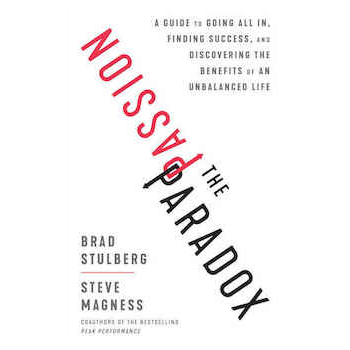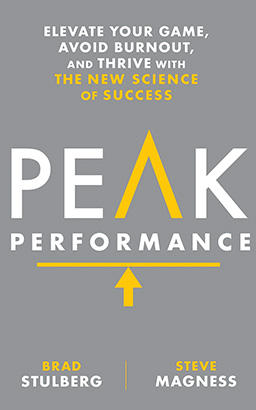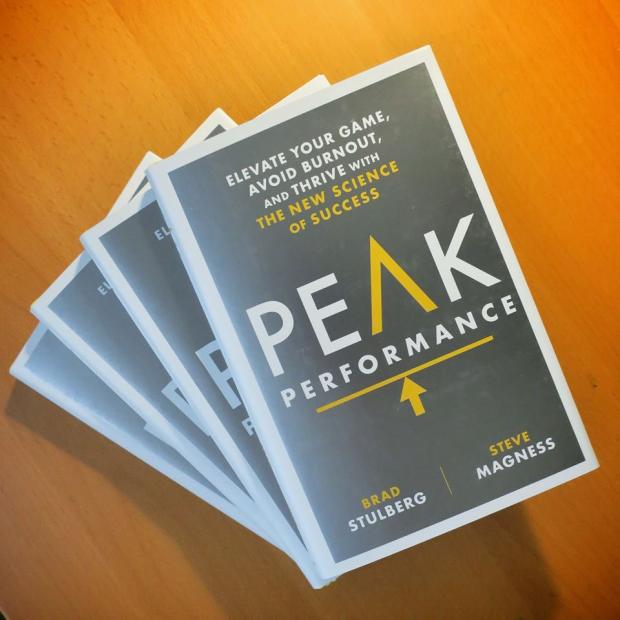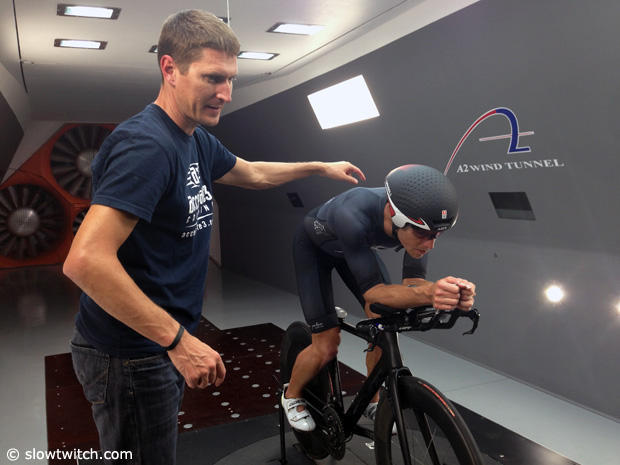The Passion Paradox: PP2 v PP1

I "read" both of Brad Stuhlberg and Steve Magness's books – Peak Performance and The Passion Paradox – in the same way – by listening to them. Given the topic of both books, I'll cite the research that shows that listening to books is a good proxy for sight reading. As compared with content like a podcast that is meant to be consumed aurally, hearing someone read a book is not quite the same, though, especially if you do it while doing another task (in my case, I driving). Accordingly, I wouldn't say that my grasp of either book is quite as good as if I'd read it. However, given that I have a long commute now, I likely wouldn't have gotten a chance to experience these books if I had to sit down and read them. Nevertheless, it's not quite the same as reading, and I'd be remiss if I didn't mention this from the outset.
One final note on the Audible versions of both books – they are both read by narrator Christopher Lane, who was selected by Brilliance Audio, the production company that bought the rights to both books, and Brad and Steve had literally no oversight of the process. To me, Lane is a competent narrator, but he doesn't "sound" like Brad and Steve to me. Now, I've never actually spoken verbally to either of them, but I've communicated with both of them a fair bit and the voice in my head doesn't match well stylistically in my opinion with Lane's style. This is one of the inherent drawbacks of audiobooks; the role of the narrator becomes prominent in a way that isn't necessarily fair to the authors. I did not feel that Lane was a particularly good narrator for these books, and it's hard for me to separate that from the book. I think my opinion of the book would be higher if I'd read it because I didn't personally enjoy Lane's narration, so please take that into consideration.
We published three separate reviews of Peak Performance, sourced by three fantastic forum members, each of whom brought a great – and unique – perspective to their review. I'd have been interested in having each of those authors offer their review of The Passion Paradox as well, but for now, I'll have to do my best to fill in, though I do think that any book like this is better served by a collective review.
I do think that the advances that Brad and Steve have made as writers, in particular with regards to writing a book as opposed to a "series of articles," is obvious. This is clearly their second book while it also seems even more apparent – and by their own admission as well – that Peak Performance was their first. The Passion Paradox also seemed more mature in that it seemed to be a more immersive – and ultimately actionable – book for readers than Peak Performance. And it had a better narrative thread.
However, I had my own contentions with some of the examples of Peak Performance used, and The Passion Paradox unfortunately seems to suffer from some of the same issues. This is a challenge with any book on "high performers," because people's perspective on what exactly that means varies widely. Some folks – like Warren Buffet – are fairly "safe" choices. Others are more contentious, though the target audience certainly plays a role here, and I think with lesser known choices, there's a risk of losing the audience giving too much background. Rich Roll's story, in particular, felt like a poor match for the overall message of the book because the narrative arc was much less obvious. On the other hand, Siri Lindley's story did resonate, but I wonder if that would be the case if I hadn't already known who she was and so much about here. I also thought Buffet, while a "safe" choice, was a poor choice here because all of the content about him was, at best, second hand. The authors had no direct discussions with him. And the sections about Buffet felt a bit like, "this is what some other people think about what Warren Buffet is passionate about." It seemed as if the authors were seeking a clearly well known example to add credibility to some of the lesser known examples where the authors did have a personal connection and were able to interview the source directly.
I had some similar contentions with Peak Performance. I had trouble with the inclusion of Josh Waitzkin, in particular, whose story seemed in direct contrast to the primary message of the book, something that I also experienced reading Waitzkin's own book, The Art Of Learning. But Warren Buffett via – at best – second hand commentary, Dr. Michael Joyner, Siri Lindley, and Rich Roll are an odd mix; toss in Jeff Skilling of ENRON as an example of "what not to be" and it's just… odd. It's less about them not being "good" examples. It's more that they felt like anecdotes for the sake of anecdotes because people like anecdotes. But unlike an author like Malcolm Gladwell, for whom anecdote is the backbone of his books, the anecdotes here felt more disjointed and, for me, took away from the larger message of the book.
Ultimately, I feel like the research angles are the strongest parts of both The Passion Paradox and Peak Performance. Brad and Steve are both great at writing about science. They do a great job of summarizing research into meaningful and actionable content. Their best writing makes research approachable. But the people chosen for the illustrative anecdotes end up being cast as much more two dimensional than I believe any person is, in large part to fit a narrative arc that can seem forced.
There are, however, two particular exceptions. And that is when Brad and Steve talk about themselves. Steve was a phenomenal high school runner who never quite lived up to the promise he showed as a junior later in his running career. Brad was an extremely successful management consultant who gave up a promising career in that area to pursue writing. When Brad and Steve talk about their own struggles with passion, the success that their passions ultimately led them to – Steve as a coach and writer and Brad as a writer, and dive deep into the simultaneously destructive and constructive role that passion has played in their own lives, that is what resonates. Rather than seeming arrogant, when Brad and Steve talk about themselves, it makes the book seem genuine in a way that they never quite achieve writing about others.
The book starts out with a discussion about the root of the word passion, which initially meant suffering and which only more recently has come to have the more positive connotations that we associate with the word. Brad and Steve make a convincing argument for the importance of keeping perspective on the original meaning. That passion can mean suffering. And often does. And that such suffering is not always a good thing. Nor is it always a bad thing. Chapter 2 – "The Origins of Passion: A Brief History Of Suffering And Love" – is one of the best. It's here that Brad and Steve are in their zone, writing in a thoughtful way about detail and nuance. And, in particular, they don't get bogged down with irrelevant anecdotes.
Chapter 6 – "The Illusion Of Balance" – was also outstanding. And it was the one that resonated most strongly with me and my own experiences. I do not enjoy the idea of a "balanced" life in terms of diversity of experience and interests. I very much enjoy going "all-in" in one (or two) very narrow areas of focus. For such people, "balance" is about balance between going all-in and taking a break. It's not about being somewhat invested in a bunch of different areas. It was this advice – if you love something, commit to it, but remember to take a break as well – that I found most compelling. Dabbling is important – see David Epstein's recent book Range, but once you find something that truly does grab hold of you, pursue it. Just don't let it rob you of perspective. Perspective – not balance – is what this books make a compelling argument for. And I think that's a powerful difference. And a powerful lesson. Perspective and balance are not synonyms, but I think they are often conflated. The Passion Paradox makes the case against such conflation.
This is certainly a book that I wish had existed when I made my living racing. I struggled throughout my career to maintain perspective, and I think that a book like this would have helped. Then again, perhaps being two years removed from that life, I'm simply now receptive to the ideas and messages of such a book in a way that I wasn't back then. When you have perspective, it's easier to understand its value. When you lack perspective, it's much harder to realize that it's gone missing.
The hardcover book is currently on sale for $7.73 from Amazon. At that price, it's hard not to recommend. It's clearly a work of passion – productive passion – from two men who strive to live by the advice they offer to others, and who are open and honest about both their successes and their failings. I hope for their next book they have the courage to draw more on that experience, because I believe it's their most powerful narrative.




